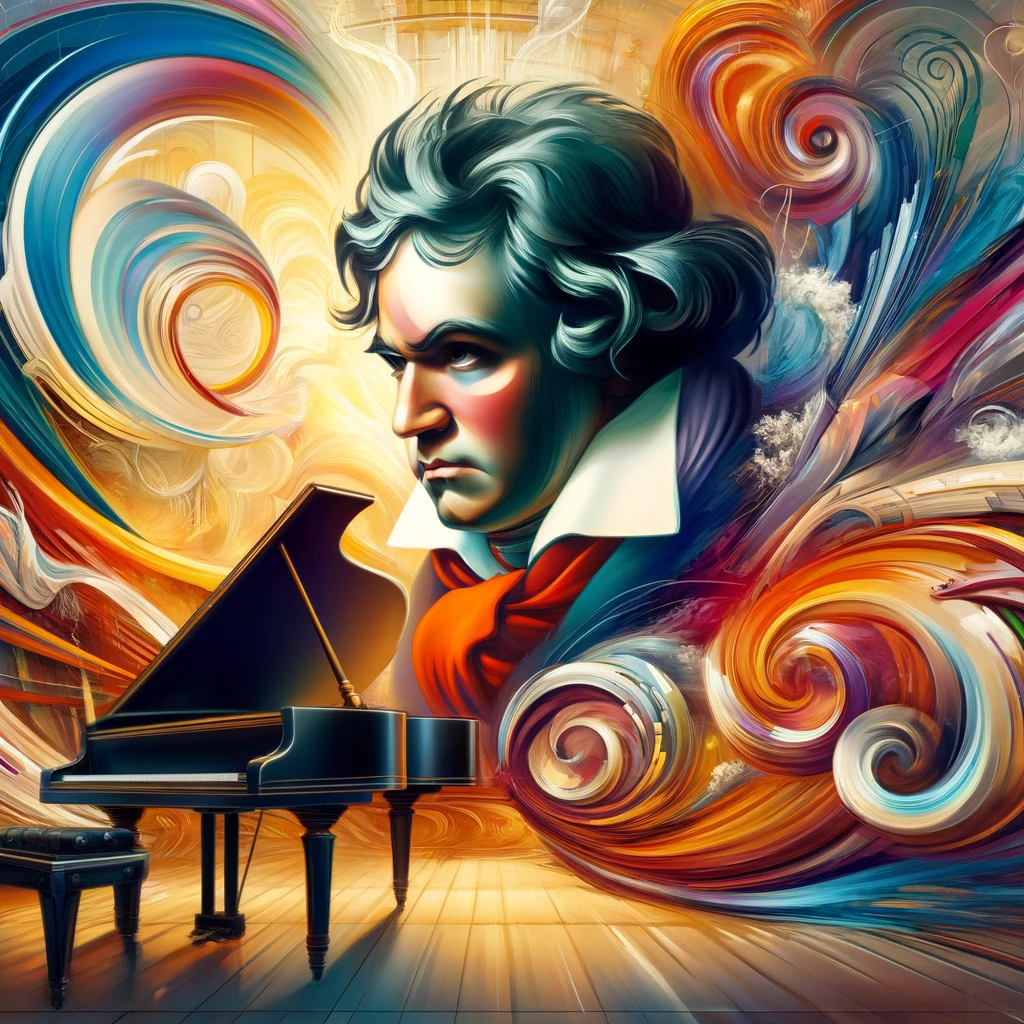
Beethoven’s Heroic Style: A New Era in Music
The Dawn of a Musical Titan
Ludwig van Beethoven, a name synonymous with musical genius, didn’t always have it easy. His journey to becoming one of history’s most celebrated composers was filled with struggles, but also marked by groundbreaking achievements. This story isn’t just about his music; it’s about the man behind the symphonies, his resilience, and how he forever altered the musical landscape.
Early Years: Talent in Turmoil
Born in 1770 in Bonn, Germany, Beethoven’s early life was anything but smooth. His father, Johann, recognizing Ludwig’s talent, became an oppressive figure, pushing him hard to succeed. Despite this rocky start, young Beethoven’s talent was undeniable. He was already composing by his early teens, but it wasn’t until his move to Vienna that his career truly began to take shape.
Vienna: A Stage for Greatness
In Vienna, Beethoven found himself in Europe’s cultural heart. Here, he honed his craft under the tutelage of Joseph Haydn. Vienna also exposed Beethoven to a myriad of musical influences, which played a crucial role in his artistic development. It was in this vibrant city that Beethoven began to find his unique voice, one that would challenge existing musical norms.
The Heroic Style: Defying Convention
Around 1803, something shifted in Beethoven’s work. We now call this his ‘Heroic’ period – a time when his compositions became bolder, more expressive, and, frankly, revolutionary. Works like the “Eroica” Symphony and “Fidelio,” his only opera, showcase this dramatic change. This era of his work wasn’t just about creating beautiful music; it was a statement, a rebellion against the restrained classical style of his predecessors.
Personal Struggles: The Man Behind the Music
But what fueled this fiery change? Beethoven’s personal life was fraught with challenges. The most devastating was his gradual hearing loss, beginning around 1796. Imagine, a musician of his caliber losing the very sense that defines his art. This struggle deeply affected Beethoven, yet, it also seemed to ignite a fierce determination in him to push the boundaries of what music could express.
Overcoming Adversity: The Power of Will
Beethoven’s response to his hearing loss is perhaps the most defining aspect of his heroic phase. Instead of succumbing to despair, he adapted and fought through. His compositions during this time, filled with emotion and complexity, were like nothing seen before. They reflected not only his personal struggles but also the broader human experience – triumph, despair, love, and rage.
Legacy: Shaping the Future of Music
Beethoven’s impact on the world of music is immeasurable. His heroic style paved the way for the Romantic era, influencing composers like Schubert, Brahms, and Wagner. His bold approach to composition and willingness to break free from traditional structures inspired generations of musicians to experiment and express more freely.

The Symphony of a Lifetime: Eroica
“Symphony No. 3 in E-flat major,” also known as “Eroica,” is often considered the starting point of Beethoven’s Heroic period. Originally dedicated to Napoleon Bonaparte, whom Beethoven initially admired as a symbol of freedom and democracy, the dedication was furiously scratched out when Napoleon declared himself Emperor. This act reflected not just a political stance but also the composer’s deep belief in liberty and justice, themes that resonate throughout the symphony. The “Eroica” is longer and more complex than any symphony written before, packed with emotional depth that was unprecedented.
Fidelio: A Cry for Freedom
“Fidelio,” Beethoven’s only opera, is another hallmark of his Heroic phase. It tells a story of personal sacrifice, heroism, and the triumph of love over tyranny. Beethoven struggled with “Fidelio,” revising it multiple times, but the final result is a powerful testament to his ideals. The opera’s themes of freedom and justice mirrored his own struggles and beliefs, making it not just a musical masterpiece but a socio-political statement as well.
The Personal Echoes in Music
Beethoven’s personal struggles, especially his hearing loss, had a profound influence on his music. His late works, composed when he was almost completely deaf, are particularly introspective and innovative. Pieces like the “Late String Quartets” and the “Ninth Symphony” break new ground in their structural complexity and emotional depth. They are often seen as a direct reflection of Beethoven’s inner world, a world where silence was met with an unyielding creative spirit.
Inspiring Future Generations
Beethoven’s influence extended far beyond his lifetime. His Heroic style signaled a shift from the Classical to the Romantic era in music. Composers like Franz Schubert and Johannes Brahms saw him as a hero who defied the norms, inspiring them to explore their own emotional depths in music. Wagner referred to Beethoven’s Ninth Symphony as “the music of the future,” foreseeing how Beethoven’s innovations would echo through the centuries.
The Enduring Legacy
Today, Beethoven is celebrated not just for his musical genius but for his role as a cultural icon. His life and work symbolize the triumph of the human spirit over adversity. His Heroic period, in particular, represents a time when music became a medium for profound personal expression, transcending the mere act of composition to become a reflection of the human condition.
In a world where we often face seemingly insurmountable challenges, Beethoven’s story and his music continue to inspire. His journey reminds us that even in the darkest of times, creativity and determination can lead to extraordinary achievements. Beethoven didn’t just compose music; he composed a legacy that continues to resonate, teaching us about resilience, innovation, and the enduring power of the human spirit.
Conclusion: A Timeless Echo
Ludwig van Beethoven’s transition into his Heroic style marked the birth of a new musical era. Through his innovative compositions and his personal journey of overcoming adversity, Beethoven became much more than a composer; he became a symbol of human resilience and artistic bravery. His music, imbued with his struggles and triumphs, continues to inspire and move audiences around the world. Beethoven’s legacy is a testament to the power of the human spirit to not just endure but to transform challenges into enduring art, making him an eternal figure in the world of music and beyond.